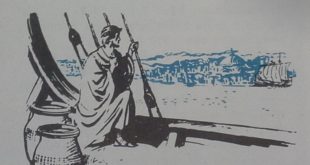Christianity was the movement that spread Across the Roman Empire Pointing the way for the rest of the ancient world toward belief in a single God. The year is 400 A.D. Andropolos paces impatiently up and down the deck of the merchant ship. He is eager to get back home; and to Andropolos, home is the city of Constantinople, a new capital of the Roman Empire. He can already see the walls and buildings of the great city shimmering in the distance. Now the ship is nearing the narrow Bosporus, the waterway where Europe and Asia are hardly a mile …
Read More »Tag Archives: Hippodrome
The Great Justinian A.D. 532-565
THE STREETS of Constantinople were thronged that Tuesday morning in January of 532. Public buildings were closed. Shops on the Street of the Silversmiths were barred and shuttered. The barracks at Strategium were occupied by regiments of soldiers which had recently arrived from the frontiers. The soldiers had orders to stay in their quarters, for this was a day of the people. It was the opening day of the great chariot races at the Hippodrome. Most of the people in the crowded streets wore winter cloaks and carried their lunches. Ordinary citizens did not wear Roman togas, for that was the dress …
Read More »The Greek Way of Life 700 B. C. – 343 B. C.
In the first years of Spartan peace, Greece was filled with wandering soldiers. Their little cities needed them no more. The new governments, which Spartans appointed, looked on them as men who might make trouble and were quick to get rid of them. Homeless and with no way to earn a living, the old campaigners roamed from place to place. They became soldiers of fortune, men who fought for any general or city that offered pay and three meals a day. In 401 B. C., ten thousand of them hired themselves out to Cyrus, a prince of Persia, who hoped …
Read More »

